LATEST BLOGS
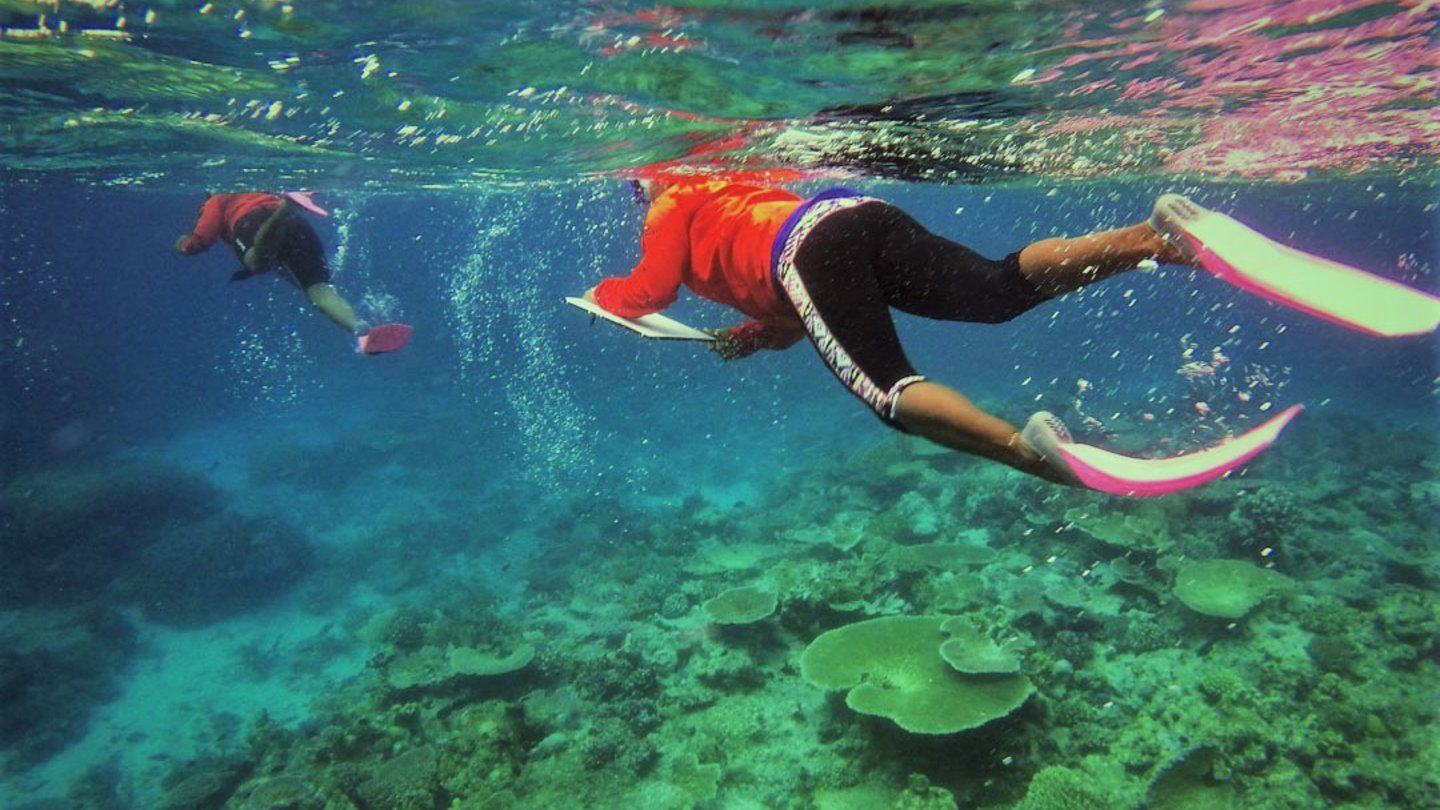
Report - Sea Woman of Melanesia Program
By Terry Smith | Blog | 1 Oct 2019
Report on - THE SEA WOMEN OF MELANESIA PROGRAM - PNG
The Coral Sea Foundation, in collaboration with the Conflict Island Conservation Initiative, ran a program empowering local Papua New Guinea women, to be custodians of their local reefs, on the Conflict Islands, in Papua New Guinea. This is the report from that program.
I have recently returned from Papua New Guinea via Cairns after attending & helping with the Sea Women of Melanesia Program. The program was held on the Conflict Islands, PNG in collaboration with The Coral Sea Foundation and the Conflict Islands Conservation Initiative (CICI).
WHAT AN AWESOME EXPERIENCE!
This was the first time for me in many ways. First time to Papua New Guinea, first time to the Conflict Islands, first time working directly with The Coral Sea Foundation & CICI, and the first time to experience the PNG hospitality. The Papua New Guinea people are resilient, hardworking, adaptive and friendly people. This was capped off, by being able to help teach the Open Water course to six local Milne Bay ladies.
THE SEA WOMEN OF MELANESIA
The ladies are from around the area of Milne Bay, looking to learn how to help marine conservation efforts for their local communities. The sustainability of their local fishing areas is becoming harder to monitor and control, with outside people (other PNG communities as well as international) fishing at an increasing rate. Large sharks are becoming rare, fish schools are doing ok, but it's about protecting their spawning grounds. Then there is the Sea Cucumber (Bêche-de-mer) industry, which is threatened due to overestimated stocks which lead to an unstainable take. (This is very lucrative for divers with sales up to $400 AUD per kilo - that's a small fortune for some villages). All issues can be addressed through community awareness.
The participating ladies, were always friendly, smiling and happy to be a part of this program. They had such a drive and determination to do well in the program, each helping each other if needed. Each lady has a different background, from different areas, and with a different story, as to why they were doing the course, but at the core, every lady has such a desire to help their communities. It was such a privilege to meet such determined ladies and an honour to teach them.
You can find detailed video stories at The Coral Sea Foundation - Sea women of Melanesia Program. Please check them out.
The Program
The first half of the program taught the ladies how to dive, with Hayley Versace from the Conflict Islands Conservation Initiative , taking the theory side. Hayley, Dave (a local PNG Dive instructor who had been through the PADI IDC training supported by the Conflict Islands) and I, took the 17 ladies for the in-water training. Most ladies had lived around water all their lives but hadn't really been in-water, as the fishing is mainly done by the men of the villages. Several ladies hadn’t snorkelled before, so we spent extra time with the ladies so that all were comfortable (these ladies are now the strongest advocates for the program). This training built in-water confidence, self-confidence and knowledge.
The second half for the program was led by Dr Andy Lewis from the Coral Sea Foundation. This foundation is at the heart of these programs empowering local women throughout the Coral Sea triangle to look at marine sustainability for their reefs & communities. The ladies learnt survey techniques which will be used to monitor their local reefs, creating a record of fish species & coral life. The survey includes noticing events like Crown of Thorns starfish activity, coral disease and coral bleaching.
Combining the two parts means the ladies are comfortable in the water and can conduct surveys on both, the surface and below the water. The ladies can then recognise if something out of the ordinary is happening and report back to their communities. This program has given them self-confidence, which was perhaps lacking or has made them stronger, which in turn, has empowered them as a person. This empowerment means they can confidently stand in front of their communities and be a strong voice for their marine environment.
They have become marine advocates for their communities!
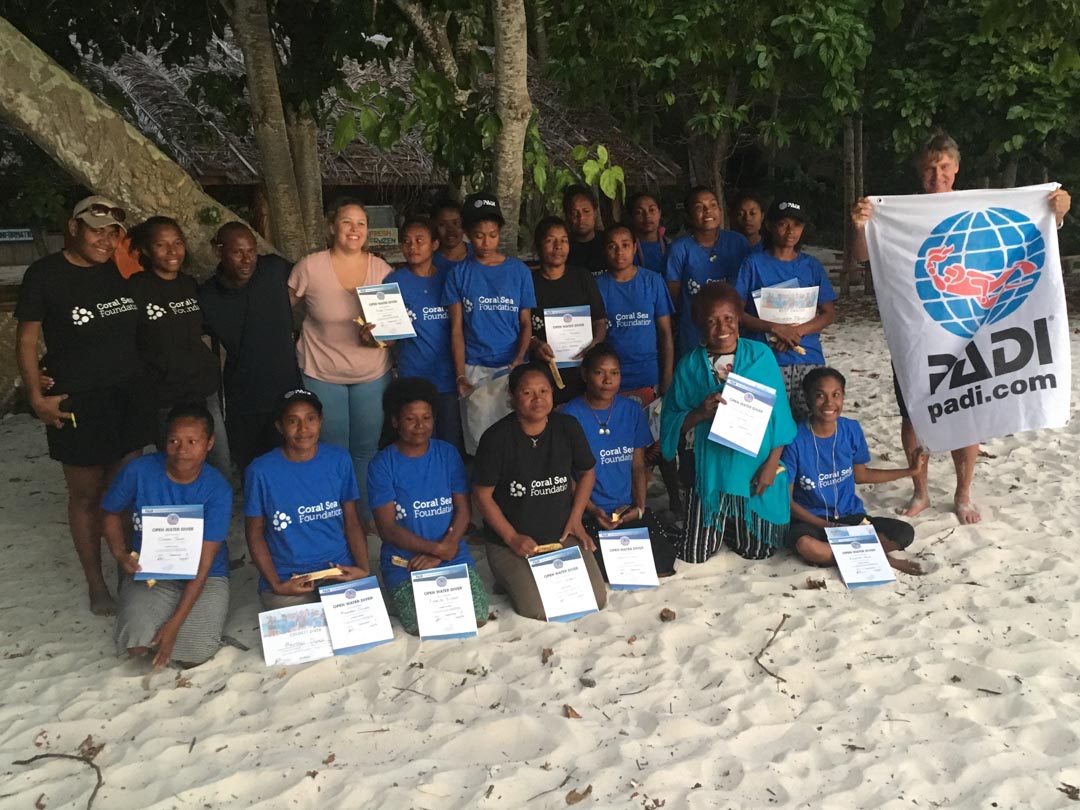
THE PADI OPEN WATER DIVE GRADUATION:
Back Row: Martha Eimba – Coral Sea Foundation – Alotau, Naomi Longa – Coral Sea Foundation – New Britain, Dave Thomas – CI Dive Instructor – Alotau, Hayley Versace – CI Dive Instructor/ Island Manager, Rose Vincent – Kwaraiwa, Gwen Able – Kwaraiwa, Atelyne Elizah – Panaeati East, Lila Ruben – Tubetube, Aplonia Lote – Panaeati East, Clera Bena – Panapompom, Dilda Philip – Panapompom, Fiona David – Anagusa, Rita Jonathan – Panaeati West, Bathsheba Gaunedi – Panaeati East, Ian Gowrie-Smith – Conflict Islands Custodian
Front Row: Doreen James – Kwaraiwa, Maureen Oliver – Alotau, Roselyn Elijah – Tewatewa, Vinah Dobin – Alotau, Dorothy David – Tubetube, Maxine Bendere Anjiga – Alotau, Annette Gele – Alotau
Note: Italics denotes home island/ township.
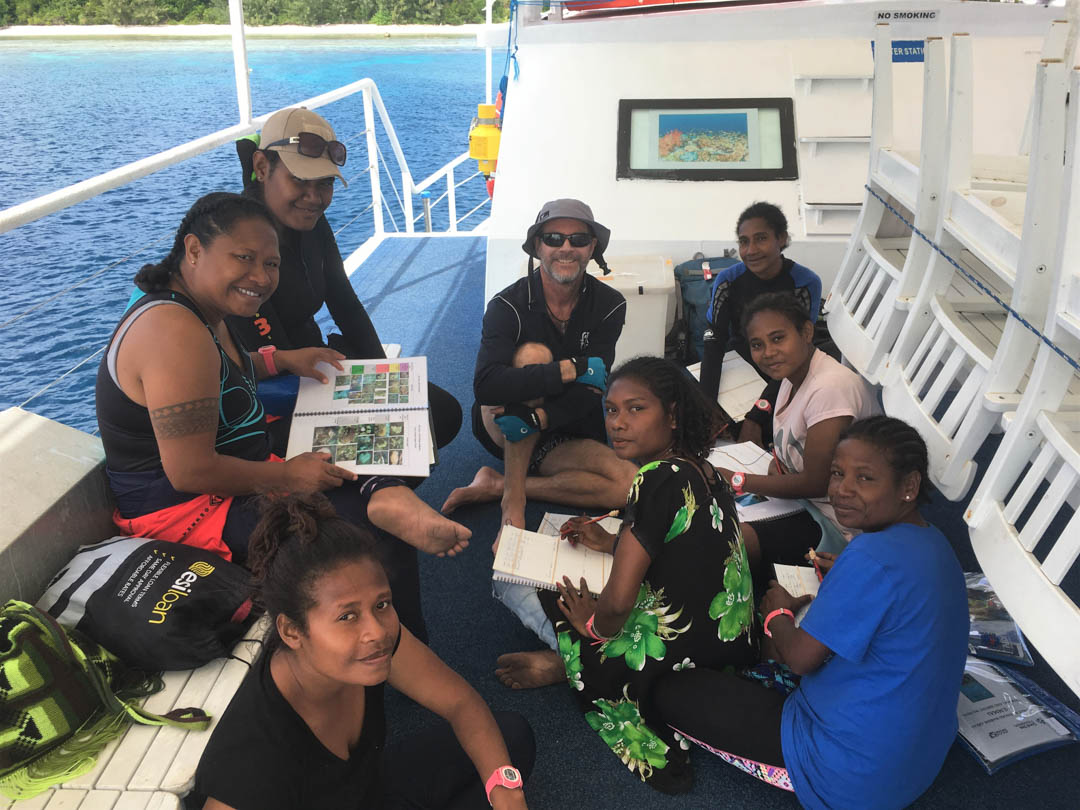
Coral Sea Foundation
I had the pleasure to meet & spend time with Dr Andy Lewis (above picture centre). He is a down to earth man who is a very passionate advocate for the marine environment/ ecosystem. Through his extensive travel in the Coral Triangle area, namely Papua New Guinea & the Solomon Islands, he has seen a need to support the local communities in their drive to protect their livelihoods, culture & their existence. This is a strong word, existence, but without the fish in the ocean, many islands will not have a source of food or income, which will then lead to the abandonment of the island they live on. Dr Andy Lewis recognises this and created the Coral Sea Foundation specifically with this goal in mind. Dr Andy & the Coral Sea Foundation, offer the tools & expertise to help set up areas (LMMA's discussed just below) where fish stock can spawn, breed & grow. Having 'no fishing' areas allows for fish to do just that and communities are becoming increasingly aware of the need for such areas.
Dr Andy Lewis is a wealth of knowledge on marine life. He has created a survey technique which notes types of coral and fish life in 50m stretches. Using visual aids and an underwater note sheet, the ladies learnt the techniques which can then be taken back to their reefs and applied. The data is collected and sent back to the Coral Sea Foundation. This data will be used to help the communities see if their actions of creating what’s called Locally Managed Marine Areas (LMMA’s) are working.
LMMA – Our Mission
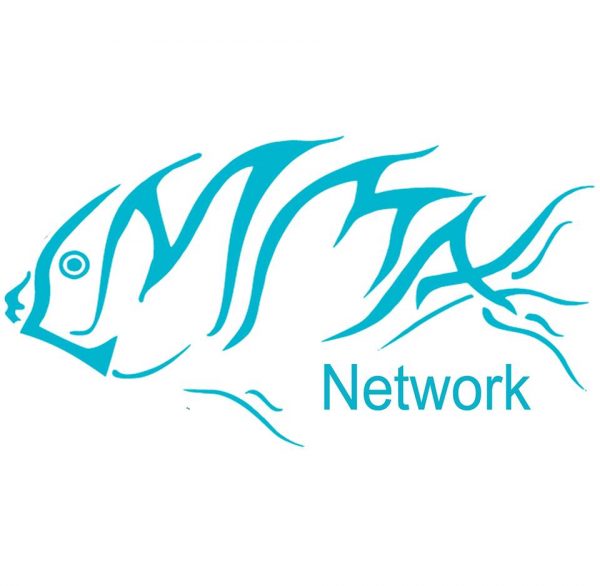
LMMA’s is a great concept which was launched in 2000. In August that year, more than 100 conservation practitioners from 20 projects in 12 countries across Southeast Asia and the Pacific gathered to discuss how to work and learn together. There, project teams identified some of the factors they believed would influence the success or failure of their projects, and ways in which they could measure project outcomes. Out of this, the idea to initiate the LMMA Network was born. (I will do a separate post on LMMA’s because it warrants one.)
Flow on Benefits
The program & the ideas behind it quickly spread throughout Milne Bay so that when an invitation was issued to presidents, wards, & councils of the surrounding islands, they turned out in numbers. Several had been newly elected to these positions and we're looking for ways to help their communities in sustainability. This was an amazing feat as many had not meet one another, or had a joint discussion, on what can be done, where it can be done and how to help each other. With Dr Andy Lewis, the Conflict Island management, Hayley Versace & Ed Cardwell, and the owner of the Conflict Islands, Ian Gowrie-Smith, discussions were held on conservation, fishing areas, ideas on local enforcement for no-fishing areas, Kastom Fees – for visiting tourists/ scuba divers (a fee which goes directly to the traditional owners of the reef or island) & of course new LMMA areas.
The Sea Women Program ideals led to these discussions and helped bring these remote Islanders, together for the first time.
Also present in these conversations was Maxine Bendere Anjiga. She is a local Papua New Guinean woman who was part of the Sea Women program. Maxine’s is the person responsible for organising the legislation, creation and basically building the entire PNG LMMA’s structure. She has pushed and worked hard to get a proposal of recognising PNG’s LMMA’s, in front of government and the proposal after many years is now in discussion for being passed as a bill (making LMMA’s recognised at government level means that under the judicial system the Province can then enforce penalties). We applaud her work & drive to make this legislation. Without this work, LMMA's would have no official governmental standing, which in turn would not allow any legal enforcement of penalties for offenders in the "no-fish" zones.
Hosts
The program was held on the main island of the Conflict Islands, Panasesa. This island is stunning, offering white sandy beaches on both sides with its own house reef. On, what's considered the backside of the island, opposite side from the lagoon, the reef drops away, creating an amazing wall & drift dive. The coral life surrounding the island is an array of species & colour. Giant clams, sponges and hard corals are thriving here. We scuba dived in several other areas around different islands, but each offered colourful corals, fish life & clear water. Diving here is absolutely top class.
The ladies (and us) were picked up from Alotau ( the main township on the main island of PNG, about a 1.2hr flight from Port Moresby), by their supply/ dive vessel the Undersea Explorer. The UE ( as its affectionately known) was a dive liveaboard, based out of Port Douglas, Australia. It has since been refurbished and "rejuvenated", with new generators, and overall is well maintained to a very high standard, although now mainly used as a supply type vessel (this will change with an announcement on "exclusive" dive charters with Pelagic Dive Travel, into this area onboard the UE). Once on the island, they were billeted in accommodation for the duration of the program. The Dr's Tony & Avril were billeted in accommodation overlooking the water.
Thanks to the Conflict Islands & the Conflict Islands Conservation Initiative, the ladies were hosted, taught and had their meals supplied. A big undertaking for 17 ladies, for accommodation, meals, the boat transfers & the use of the UE for diving. Without these facilities, the program would not have been able to operate in this area.
A big thank you to the Managers, Hayley Versace & Ed Cardwell. Without your organisation and participation, the program would not have been a success. And a very big thank you to the Custodian of the Conflict Islands, Mr Ian Gowrie-Smith. His drive and forward-thinking into the sustainability for the islands, has led to the continued development of conservation initiatives in this area. Without this vision, the Turtle, Ray and the Sea Women conservation programs would not be a reality.
Supporters
My capacity was to offer help in any way I could. I travelled to help directly, which was teaching and logistics. Pelagic Dive Travel offered its services to act as a host for the landing page, the booking platform and a contact point for any travel queries.
We had two supporters join us for the whole two weeks - Dr Tony & Avril Ayling.
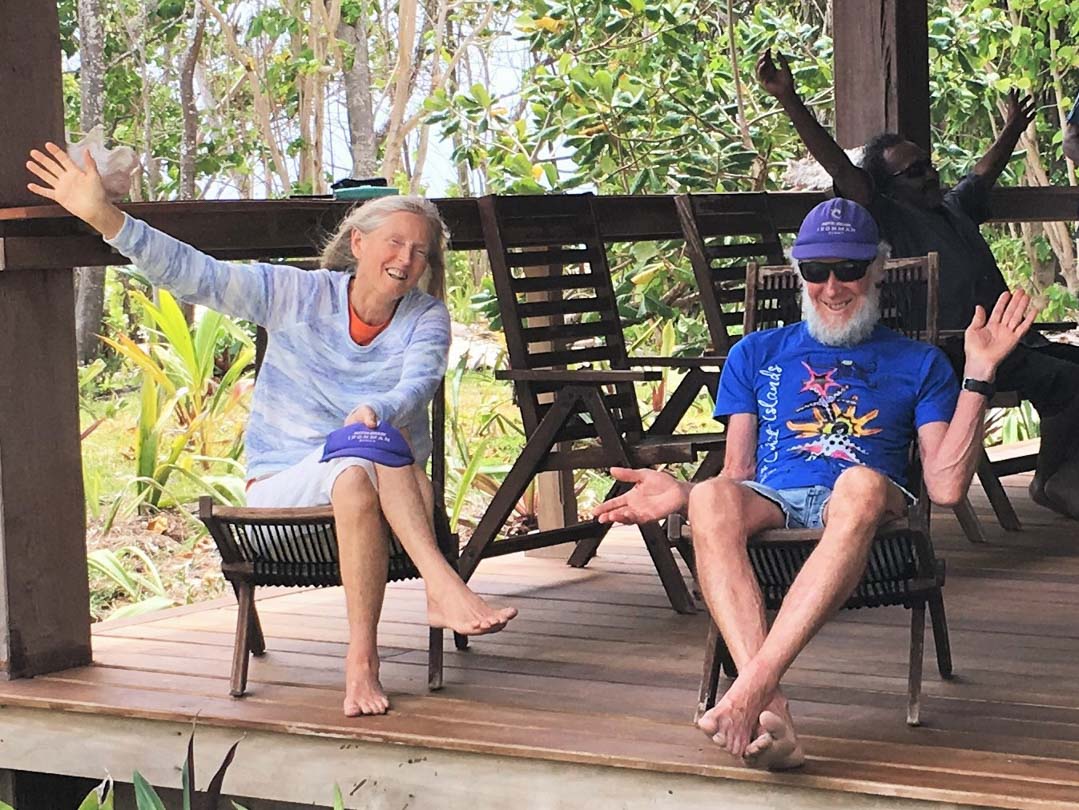
Both Tony & Avril are friendly, warm-hearted, people and avid divers. They have been diving for over 40 years, both recreational & work, as they are both marine biologists. Their wealth of knowledge on coral species was beyond reproach. (Tony can be classed as a walking marine encyclopedia as he can recall the names of thousands of fish species). They shared this knowledge and their direct encouragement to the ladies was phenomenal. They offered support and encouragement to all the ladies especially ones who were not so confident. Through their participation, they effectively sponsored the training and accommodation of several of the local ladies. The ladies and all involved are truly thankfully for your involvement and direct support.
Sponsors
There were several companies involved in the undertaking of this program. I would like to thank:
Hosts: The Conflict Island Conservation Initiative. Program: The Coral Sea Foundation. Major sponsor: P & O Cruises. Sponsors: Bambuddha Group, PADI, UNICO Conservation Foundation Ltd, Marine Foundation, Cisco, The Sea Life Trust, Superyacht Group Great Barrier Reef, Melanesian Luxury Yacht Service, Pelagic Dive Travel.
Conclusion
As you can see this program had a massive influence on the local ladies, the local communities and the local marine environments. Each party, Mr Ian Gowie- Smith - Conflict Islands Custodian, Dr Andy Lewis - Coral Sea Foundation, CICI Managers - Hayley Versace, Ed Cardwell, and Supporters - Drs Tony & Avril Ayling, found the participation so rewarding for themselves personally & for the marine environment.
For me, it was an amazing experience. To see the ladies grow in self-confidence & see them learn that they can help their communities, to sustain their marine environments, for the future, was so rewarding. The time I spent with all the ladies was a pleasure. Each lady is so full of life, fun & laughter. I hope I can participate in another program soon.
We wish all the Ladies well for the future & hope their communities flourish with the initiatives taken from this course.
FUTURE PROGRAM
There is another Sea Women of Melanesia Program running in the Solomon Islands 26 October.
If you can't manage this trip, no problem, next year there will be several more each building on the success of the last. Please sign up for the e-mail & we will keep you informed.
Supporters welcome on every program!
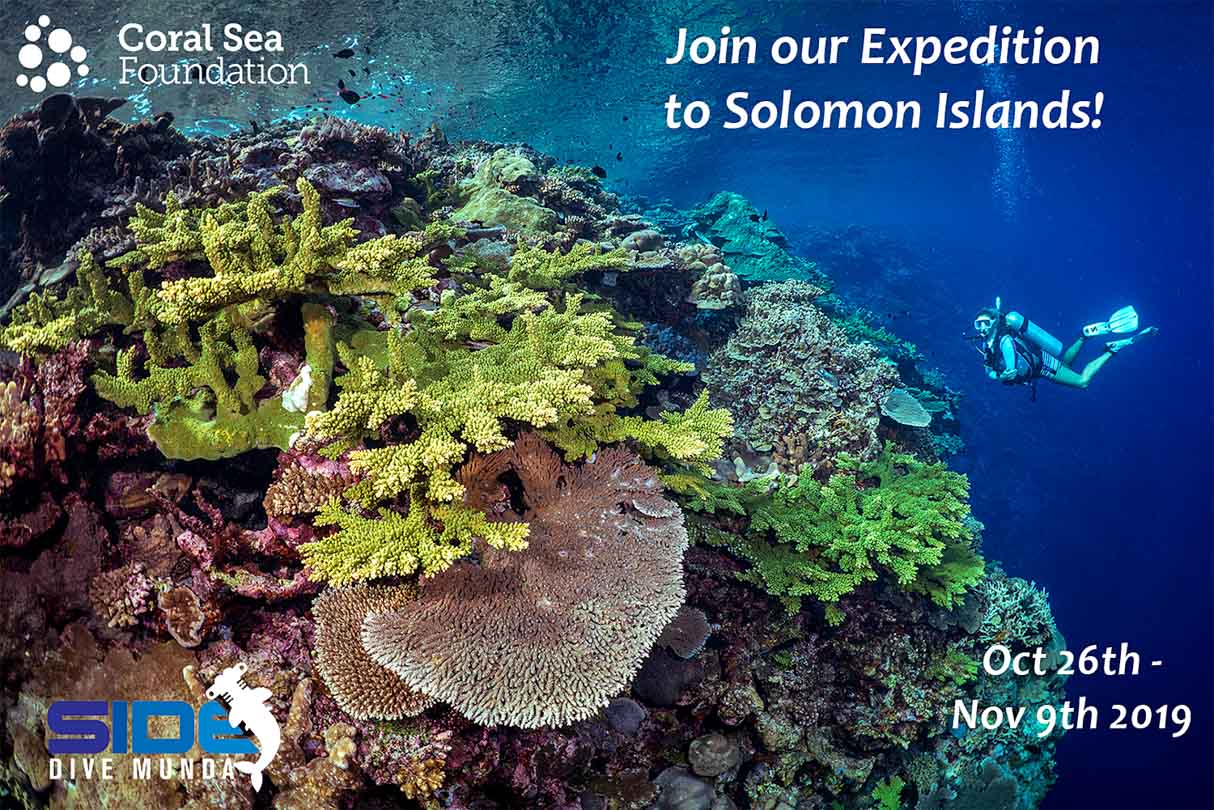
Recent
-
Thailand Arrival - Part 2
10 Apr 2022 -
Thailand pre-travel - Part 1
28 Feb 2022 -
CICI Turtle Conservation
1 Oct 2021 -
Galapagos Whale Shark Project - 2020 Research Trip Report
7 May 2021 -
Scuba Digital Dive Show
19 Oct 2020 -
Conflict Islands Dive Report
1 Oct 2020 -
SunButter Skin Care Partner
18 Jun 2020 -
The Galapagos Whale Shark Project
10 Jun 2020 -
Keep Supporting Conservation
1 Jun 2020 -
The Focus
5 Feb 2020



